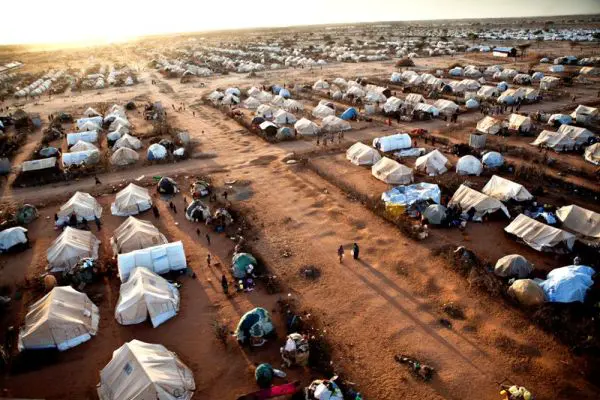Students living at the Dadaab refugee camp in northeast Kenya have appealed to the government to delay the closure of the camp to enable them to sit for examinations later this year.
The students at the world's largest refugee camp said the intended repatriation of the more than 300,000 Somali refugees in Dadaab will disrupt their education.
Dadaab was set up more than 20 years ago to house people fleeing conflict in Somalia.
Kenya in May announced it will close Dadaab by May next year, citing environmental and security concerns.
The refugees in Dadaab have their own schools and teachers inside the camps and go through the Kenyan education system and subsequently sit for the final primary and secondary examinations due in November and December.
Those interviewed in Ifo 2 refugee camp in Dadaab lamented that taking them back around the same time when they are supposed to be sitting for the national examinations would greatly inconvenience them and shut their future dreams.
Aden Hussein, a student at Golden Elite Primary School in Ifo 2, came to the camp six years ago with his parents.
"I came while in Class Two and immediately joined the school where I have been studying until now. I was anxiously looking forward to sitting for my final exam in November," Hussein told Xinhua on Wednesday.
Despite international calls on Kenya to reconsider the decision to close Dadaab, the government has remained adamant.
Another student Omar Hassan appealed to the government to spare them time and repatriate them after the exams. Hassan's school has 12 students who will sit for the exams.
For Abdi Omar, a student at Nasib Secondary School in Ifo 2, said he was finding it difficult to accept that their education could be in jeopardy.
"Honestly we are worried a lot, this is after investing a lot of time and energy hoping to rip the fruits of our efforts through education, now we are being told that we will be going back to Somalia where the education system does match the Kenyan one," he lamented.
Brian Nyongesa, a teacher at Golden Elite Primary School, said the students at his school had a good "transition system" during their period in the camps and that they expected the same transition when they went back to their homeland.
"My only hope is that the repatriation if it happens, these learners may be able to get a better education other side. I appeal to all parties concerned that these learners will get an opportunity to continue with the same transition which they get in Kenya so that they may be able to further their education," he said.
The Kenyan teachers working in the refugee schools are contacted and paid by international relief agencies.
Figures from the UN Refugee Agency (UNHCR) show the five camps of Hagardera, Ifo, Ifo 2, Dagahaley and Kambioos in Dadaab have a total of 4,575 students, who are expected to sit for the exams in the refugee camps this year -- 3,429 will sit for primary education examinations while 1,146 will sit for secondary education examinations.
According to UNHCR spokesman Duke Mwancha, the impending repatriation of Dadaab refugees has created anxiety amongst the students. Mwancha however said learning was still going as normal in schools.
"As UNHCR we will continue with our plans of preparing the candidates for the exams. The impending repatriation will not stop our teachers from preparing our students," said Mwancha.
"We however have to admit that the issue (repatriation) will definitely have an impact on the students' performance if at all they sit for the exams because their concentration has been affected," he added.
Kenya's Northeastern Regional Coordinator Mohamud Saleh said the issue of the exams will be looked into so that to "come up with an appropriate and informed decision."
(APD)
 简体中文
简体中文

